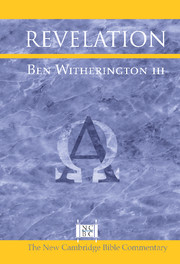Book contents
- Frontmatter
- Contents
- Preface
- A Word about Citations
- Map of Western Asia Minor and the Island of Patmos
- List of Roman Emperors
- List of Abbreviations
- I INTRODUCTION
- II SUGGESTED READING ON REVELATION
- III COMMENTARY
- IV APPENDIX: A MILLENNIAL PROBLEM
- Author Index
- Extra-Biblical Texts Index
- Scriptural Index
- Subject Index
I - INTRODUCTION
Published online by Cambridge University Press: 05 February 2015
- Frontmatter
- Contents
- Preface
- A Word about Citations
- Map of Western Asia Minor and the Island of Patmos
- List of Roman Emperors
- List of Abbreviations
- I INTRODUCTION
- II SUGGESTED READING ON REVELATION
- III COMMENTARY
- IV APPENDIX: A MILLENNIAL PROBLEM
- Author Index
- Extra-Biblical Texts Index
- Scriptural Index
- Subject Index
Summary
THE AUTHORSHIP, DATE, AND AUDIENCE OF THE APOCALYPSE
As the majority of scholars recognize, Revelation is not a pseudonymous document. Its author identifies himself at the beginning as someone named John. But which John? Is it a John we know from elsewhere in the NT, say, for example, John the son of Zebedee or, as J. M. Ford conjectured in her Anchor Bible commentary, John the Baptist? Could this John be John Mark or perhaps some heretofore unknown John? Later Christian tradition identified the author as John the son of Zebedee, but it must be borne in mind that this notion dates at least a half century after Revelation was written (the earliest possible witnesses are Justin Martyr and Irenaeus from the mid- and late second century a.d. respectively – Justin, Dial. 81.4; Irenaeus, Adv. Haer. 4.20.11) and during an era when connecting sacred documents to apostolic witnesses was considered crucial, especially if such documents were to be recognized as having some sort of canonical status.
How does the author identify himself? He calls himself John the servant of Christ (1.2) who testified to certain things based on what Christ showed him through an angelic mediator. In other words John is claiming to be a visionary and a testifier, and if the term “servant” has the fuller resonance it does sometimes in the Old Testament (OT) prophetic corpus, in the Pauline writings, and elsewhere, he is claiming to be a prophet. In Rev. 22.9 the author clearly classes himself as among the prophets, and other chapters in the work (e.g., Rev. 10) make it apparent that this is the way the author chiefly views himself. In short the author is John the seer who offers up prophetic testimonies and proclamations. He does not identify himself as an apostle, nor does he call himself the Beloved Disciple or, for that matter, the Elder (see 2 and 3 John).
The discussion of which John has been complicated by attempts to figure out the interrelationships between the Gospel, Epistles, and Revelation that came to be associated with John's name.
- Type
- Chapter
- Information
- Revelation , pp. 1 - 50Publisher: Cambridge University PressPrint publication year: 2003



